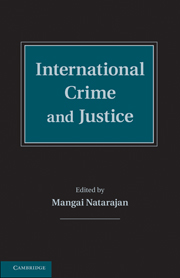Book contents
- Frontmatter
- Contents
- List of Figures
- List of Tables
- List of Contributors
- Foreword
- Preface
- Introduction
- Part I International Criminology
- Part II Law, Punishment, and Crime Control Philosophies of the World
- Part III Transnational Crime
- Part IV Organized Crime and Terrorism
- Part V International crime
- Part VI Delivering International Justice
- Part VII International Cooperation and Criminal Justice
- 54 World Policing Models
- 55 Crossborder Policing
- 56 Challenge and Transition
- 57 The European Union and Judicial Cooperation
- 58 The Longer Arm of the Law
- 59 International Cooperation to Combat Money Laundering
- Part VIII International Research and Crime Statistics
- Part IX International research resources
- World Map
- Index
- References
57 - The European Union and Judicial Cooperation
Published online by Cambridge University Press: 05 October 2014
- Frontmatter
- Contents
- List of Figures
- List of Tables
- List of Contributors
- Foreword
- Preface
- Introduction
- Part I International Criminology
- Part II Law, Punishment, and Crime Control Philosophies of the World
- Part III Transnational Crime
- Part IV Organized Crime and Terrorism
- Part V International crime
- Part VI Delivering International Justice
- Part VII International Cooperation and Criminal Justice
- 54 World Policing Models
- 55 Crossborder Policing
- 56 Challenge and Transition
- 57 The European Union and Judicial Cooperation
- 58 The Longer Arm of the Law
- 59 International Cooperation to Combat Money Laundering
- Part VIII International Research and Crime Statistics
- Part IX International research resources
- World Map
- Index
- References
Summary
GENERAL OVERVIEW
Traditionally, each country around the world makes its own decisions on law and policy. Even in the modern world, where the emphasis is on international cooperation, it is the national government that sets the policy, the national legislature that enacts the law, and the national courts that have the final say on what is lawful and what is not.
The European Union is an exception to this rule, and represents a unique form of international cooperation. A total of twenty-seven European countries have joined together to form an intergovernmental structure. Many important policy questions that have crossborder implications are decided by these “member states” acting together. Once such a decision is taken by the European Union, each national legislature must adapt its laws accordingly. The decisions concern not only police and judicial cooperation, but also for example migration and border control, taxation, the economy, consumer affairs, industry, agriculture, and so on.
Police and judicial cooperation in the European Union consists primarily of measures designed to ensure that offenders cannot take advantage of differences in national law and national jurisdiction, and that they can and will be brought to justice no matter where they commit their offence. Since September 11, 2001 in particular, the reality and the threat of terrorism have led to increased attention being paid to cooperation in criminal justice and in the management of borders.
- Type
- Chapter
- Information
- International Crime and Justice , pp. 430 - 436Publisher: Cambridge University PressPrint publication year: 2010



